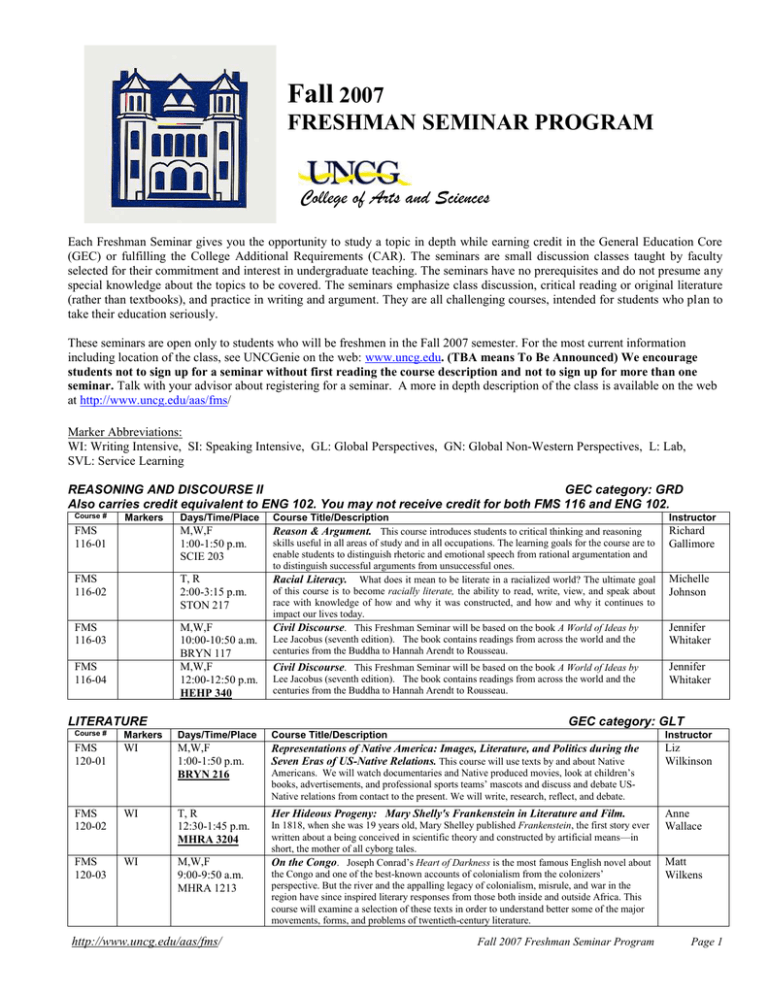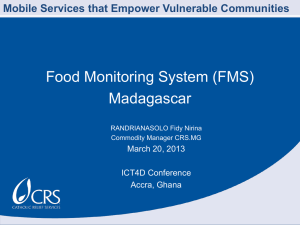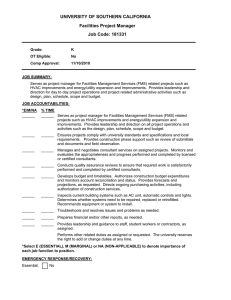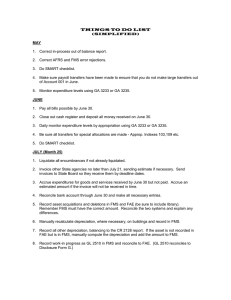Booklet FMS Fall 2007
advertisement

Fall 2007 FRESHMAN SEMINAR PROGRAM College of Arts and Sciences Each Freshman Seminar gives you the opportunity to study a topic in depth while earning credit in the General Education Core (GEC) or fulfilling the College Additional Requirements (CAR). The seminars are small discussion classes taught by faculty selected for their commitment and interest in undergraduate teaching. The seminars have no prerequisites and do not presume any special knowledge about the topics to be covered. The seminars emphasize class discussion, critical reading or original literature (rather than textbooks), and practice in writing and argument. They are all challenging courses, intended for students who plan to take their education seriously. These seminars are open only to students who will be freshmen in the Fall 2007 semester. For the most current information including location of the class, see UNCGenie on the web: www.uncg.edu. (TBA means To Be Announced) We encourage students not to sign up for a seminar without first reading the course description and not to sign up for more than one seminar. Talk with your advisor about registering for a seminar. A more in depth description of the class is available on the web at http://www.uncg.edu/aas/fms/ Marker Abbreviations: WI: Writing Intensive, SI: Speaking Intensive, GL: Global Perspectives, GN: Global Non-Western Perspectives, L: Lab, SVL: Service Learning REASONING AND DISCOURSE II GEC category: GRD Also carries credit equivalent to ENG 102. You may not receive credit for both FMS 116 and ENG 102. Course # Markers Days/Time/Place FMS 116-01 M,W,F 1:00-1:50 p.m. SCIE 203 FMS 116-02 T, R 2:00-3:15 p.m. STON 217 FMS 116-03 M,W,F 10:00-10:50 a.m. BRYN 117 M,W,F 12:00-12:50 p.m. HEHP 340 FMS 116-04 Course Title/Description Reason & Argument. This course introduces students to critical thinking and reasoning skills useful in all areas of study and in all occupations. The learning goals for the course are to enable students to distinguish rhetoric and emotional speech from rational argumentation and to distinguish successful arguments from unsuccessful ones. Racial Literacy. What does it mean to be literate in a racialized world? The ultimate goal of this course is to become racially literate, the ability to read, write, view, and speak about race with knowledge of how and why it was constructed, and how and why it continues to impact our lives today. Civil Discourse. This Freshman Seminar will be based on the book A World of Ideas by Lee Jacobus (seventh edition). The book contains readings from across the world and the centuries from the Buddha to Hannah Arendt to Rousseau. Instructor Civil Discourse. This Freshman Seminar will be based on the book A World of Ideas by Jennifer Whitaker Lee Jacobus (seventh edition). The book contains readings from across the world and the centuries from the Buddha to Hannah Arendt to Rousseau. LITERATURE Richard Gallimore Michelle Johnson Jennifer Whitaker GEC category: GLT Course # Markers Days/Time/Place Course Title/Description Instructor FMS 120-01 WI M,W,F 1:00-1:50 p.m. BRYN 216 Representations of Native America: Images, Literature, and Politics during the Seven Eras of US-Native Relations. This course will use texts by and about Native Liz Wilkinson T, R 12:30-1:45 p.m. MHRA 3204 Her Hideous Progeny: Mary Shelly's Frankenstein in Literature and Film. FMS 120-02 WI FMS 120-03 WI M,W,F 9:00-9:50 a.m. MHRA 1213 http://www.uncg.edu/aas/fms/ Americans. We will watch documentaries and Native produced movies, look at children’s books, advertisements, and professional sports teams’ mascots and discuss and debate USNative relations from contact to the present. We will write, research, reflect, and debate. In 1818, when she was 19 years old, Mary Shelley published Frankenstein, the first story ever written about a being conceived in scientific theory and constructed by artificial means—in short, the mother of all cyborg tales. On the Congo. Joseph Conrad’s Heart of Darkness is the most famous English novel about the Congo and one of the best-known accounts of colonialism from the colonizers’ perspective. But the river and the appalling legacy of colonialism, misrule, and war in the region have since inspired literary responses from those both inside and outside Africa. This course will examine a selection of these texts in order to understand better some of the major movements, forms, and problems of twentieth-century literature. Fall 2007 Freshman Seminar Program Anne Wallace Matt Wilkens Page 1 FMS 120-04 WI FMS 122-01 WI, GN FMS 122-03 WI, GN T,R 3:30-4:45 p.m. GRAM 204 Telling Stories: A Course on the Memoir. In this course we’ll read three book-length M, W, F 1:00-1:50 p.m. GRAM 204 Latin America: Time, Memory and Identity. A selection of some of the best 20th- M, W, F 9:00-9:50 a.m. GRAM 310 The Empire Writes Back: A Fresh Look At World Literature. This course will deal memoirs and a variety of personal memory essays. In addition, we’ll view memoirs on film, in comics, and visit the Weatherspoon Art Museum. Students will also be encouraged to experiment with the craft, conveying slices of their own pasts. century novelists and short-story authors from Mexico, Guatemala, Chile, Argentina and Puerto Rico. These men and women offer unique and creative responses to political, economic and social struggle in changing times. with twentieth and twenty-first century literatures from all over the world. Many so-called "world literature" authors have purposefully built on and subverted the tropes created and propagated by Western "canonical" authors. We will be taking a look at several works like this, many of which students have likely not encountered before, and comparing them with the Western works from which they derive, coming to understand in the process that such writing is not merely derivative, but instead can be a source of inspiration, innovation, and power. FINE ARTS Deborah Seabrooke Laura Chesak Dorothy Kuykendal GEC category: GFA Course # Markers Days/Time/Place Course Title/Description Instructor FMS 130-01 WI T,R 9:30-10:45 a.m. Mary Foust Hall 10 Watts is All You Need: Indy Rock Culture. From the quirky art-rock of DEVO and Thomas Dempster FMS 130-02 WI T,R 2:00-3:15 p.m. MHRA 2208 A Place You Have Never Been: An examination of the elements that make great Documentary Cinema. This course will show documentaries that take the students to Christina Nova places that they have never been. We will explore the lives of street kids, urban messengers, police, body builders, rock stars, bible salesmen, politicians, basketball players, skateboarders and mine workers as we screen documentaries on these groups. Storytelling Across Culture. Take a journey into the folklore of Non-Western countries as we advance multicultural education and foster an appreciation of diversity. Students will research, read, analyze, and perform stories of their choice; from around the world. As the journey comes to an end the final storytelling project of this service-learning course will involve telling stories to children at the Greensboro Public Library. This course is Speaking Intensive and is a Service Learning Course. Kimberly Cuny Opposites Attract: Tennessee Williams and Arthur Miller – America’s Postwar Theatre Giants. Theatre is a mirror held up to life. In this course, we’ll look at postwar Jeffrey West FMS 130-03 WI, SI, SVL T,R 9:30-10:45 a.m. MCVR 021 FMS 130-04 WI T,R 2:00-3:15 p.m. MCVR 225 the Talking Heads to the icon of Björk and the eclectic TV on the Radio, college radio and “rock” and its youth-culture has launched, rescued, and sometimes destroyed the careers of various artists and groups. This course explores the history of this wide and inclusive “genre,” discusses the criticisms and politics of “independent” music, and seeks to engage students in writing their own music criticism pieces, attending live performances, and discussing the future of the “independent” media in a rapidly changing technological landscape. A final, substantial piece of music criticism or a research paper will be coached and revised with the aid of the instructor through the initial stages to the final draft. American society in the mirrors held up by two of our best playwrights. Miller and Williams, men who come from two very different segments of society, share the ability to bring to life a stunning range of characters who tell us much about the ‘American Dream’ and its effects. We’ll read the major plays, see several film adaptations, write responses to the works and to some selected criticism, and act some pivotal scenes. PHILOSOPHICAL, RELIGIOUS, AND ETHICAL PRINCIPLES Course # Markers Days/Time/Place FMS 141-01 WI, GL T,R 9:30-10:45 a.m. MHRA 1209 FMS 142-01 WI, GN T,R 11:00-12:15 p.m. BRYN 204 GEC category: GPR Course Title/Description It’s a Small World. Fairness, justice, human dignity, equality… the concepts that have challenged ethical people throughout history are magnified in the global society. What does it mean to be fair when the people in question have radically different lifestyles? Is it even possible to think about every human being as a member of the same community? In this course we’ll look closely at a few key authors’ takes on the question of global society. This course is a discussion-based, writing intensive seminar. Instructor The Dalai Lama: Monk, Statesman, Mystic. This course will explore the complex Douglas Duckworth interrelations of politics, religion, and modernity around a contemporary contemplative and statesman: the current Tibetan leaner, the Dalai Lama. We will look into the life of the Dalai Lama in Tibet, India, and abroad in his multiple roles as a political figure, a religious leader, and a commentator on a diverse set of contemporary issues. HISTORICAL PERSPECTIVES: Pre-Modern Lauren Mackinnon GEC/CAR category: GHP/GPM Course # Markers Days/Time/Place Course Title/Description Instructor FMS 151-01 WI, GL T, R 11:00-12:15p.m. Mary Foust Hall Frozen in Time: The Archaeology of Pompeii. In this course, we will the study the Maura Heyn http://www.uncg.edu/aas/fms/ archaeological evidence for Pompeii in order to gain insight into the society of a Roman city. Buried by the eruption of Vesuvius in 79AD, Pompeii offers us the unique opportunity to see a town “frozen in time”. Despite the extraordinary preservation of the remains, many questions remain about the inhabitants of the city, particularly with regard to how they defined themselves both as a community and as individuals. In order to understand better the public and private lives of the inhabitants, we will explore the archaeological remains of Pompeii and Herculaneum (a neighboring town, which provides great comparative material). Fall 2007 Freshman Seminar Program Page 2 HISTORICAL PERSPECTIVES: Modern GEC/CAR category: GHP/GMO Course # Markers Days/Time/Place Course Title/Description Instructor FMS 160-01 WI M, W, F 10:00-10:50 a.m. Mary Foust Hall Ashby Parlor Hollywood and History: Truth, Lies and Videotape Christine Flood FMS 160-02 WI T,R 11:00-12:15 p.m. Julius Foust 111 FMS 160-03 WI T,R 2:00-3:15 p.m. GRAM 303 In this seminar, we will look at issues of power, oppression and interpersonal relationships in American History, as depicted in popular film, including “Birth of a Nation”, “Gone with the Wind”, “Grapes of Wrath”, “Casablanca”, “A Long Walk Home”, “13 Days”, and “Primary Colors”. We will context and critique the films on their historical storytelling. To facilitate these discussions, our readings will include essays on popular films, as well as a history textbook to help us contextualize the real events and issues Meaning and Memory in American Popular Music. Sometimes popular music is treated like disposable culture—the fad of the month—but a closer look shows that the most innovative figures in American music are sustained by a deep sense of history. How do artists draw on the past to create vibrant new musical styles? How do Americans’ visions of “authentic” musical roots reflect their ideas about race, class, and identity? In this course, we will look at and listen to case studies in blues, rock, rap, and genres of your choice to understand how music is shaped by—and shapes—a vision of American history. Binder’s Keepers: The History and Making of Books. The history of books tells the story of modernity. The making of books illustrates how the modern world was constructed. By examining not only the history of books but also their form and construction, the student will gain an invaluable insight into the formation of the modern world. This is not simply an intellectual history, since this course will analyze the craft of bookmaking and engage us in the composition of our own books. We will understand the limits imposed upon the written word and the other choices that have existed over time and across cultures. SOCIAL AND BEHAVIORAL STUDIES Course # Markers Days/Time/Place FMS 170-01 WI M, W, F 11:00-11:50 a.m. EBER 554 FMS 170-02 WI T,R 9:30-10:45 a.m. MHRA 1304 FMS 170-03 WI T,R 2:00-3:15 p.m. MHRA 2210 FMS 171-01 WI, GL T,R 3:30-4:45 p.m. GRAM 424 Course # Markers Days/Time/Place FMS 183-01 WI, L T,R 9:30-10:45 a.m. MCVR 256 FMS 183-02 WI T,R 9:30-10:45 a.m. GRAM 116 http://www.uncg.edu/aas/fms/ Alan Brilliant GEC category: GSB Course Title/Description On Human Nature. Human beings and the societies they create, inhabit, and destroy, are the most complex phenomena on the planet. Much is assumed, but little in understood about what it means to be human. Perhaps the most fundamental question which may be asked is, does human nature exist? Social and behavioral scientists from many “grand” disciplines (i.e., sociology, anthropology, and psychology) profoundly and doggedly grapple with this question alone. We will explore the myriad of descriptions, explanations, and methods for understanding humankind. The main intellectual “platform” for this exploration is the landmark book (and Pulitzer Prize winner) by E. O. Wilson, entitled, On Human Nature. War and Conflict. It has been estimated that there has been a war somewhere in the world 94% of the time since the dawn of civilization. Why does mankind periodically organize himself for armed conflict and warfare? This course will begin by asking these questions and try to answer them through an examination of the United States’ involvement in war and conflict over the last hundred years. Psychopathology and Film. Mental illness (psychopathology) is frequently portrayed in popular culture. The history of cinema is filled with classic films such as “A Beautiful Mind” and “One Flew Over the Cuckoo’s Nest” that have introduced society to a variety of mental disorders. The goal of the course is to use examples from popular and independent cinema as a catalyst for discussion of psychopathology, treatment, and the modern myths that often accompany mental disorders. The Hungry Coyote: Anthropologists Look at Megacities This course will explore the issue of megacities through readings and writing exercises in inference designed to expand the student's and the instructor's ability to comprehend formerly unimaginable circumstances. NATURAL SCIENCES: Physical Science Benjamin Filene Instructor Michael Cauthen A. Leigh Sink Tom Kwapil Joel Gunn GEC/CAR category: GNS/GPS Course Title/Description Physics for Everyone. From an autumn leaf gently tumbling to the ground, to a race car speeding around the track, to the planets turning in their orbits, all motion is governed by only a few fundamental laws of nature. In this course, you will build an understanding of these laws for yourself. You will take on the role of scientific investigator. Your time in class will be spent actually designing and carrying out experiments, evaluating the results, and drawing conclusions. The structure of the course provides time for small group discussion as well as dialogue between the instructor and individual students. This unconventional approach will allow you to learn about physics concepts as well as about the process of science in general in a fun and engaging way. This course fulfills a Lab requirement in GEC. Movers and Shakers: Plate Tectonics. Death! Destruction! Mayhem! (OK… life, creation and order as well.) Plate Tectonic Theory states that the crust of the Earth is broken into numerous sections called plates. Continents and ocean floors may be components of these plates. Plate sections travel across the Earth’s surface as if on conveyor belts. Plates may collide with one another, drift apart, or grind past one another. The Christmas Tsunami of 2004 which killed over 200,000 people was generated by an uplift of the ocean floor as one section of a plate rebounded as it was being forced underneath another. This course will cover concepts of Plate Tectonics in order to better understand affects generated by plate movement such as earthquakes, volcanoes, tsunamis, and mountains. Fall 2007 Freshman Seminar Program Instructor Martin Dewitt Mary Hall-Brown Page 3



